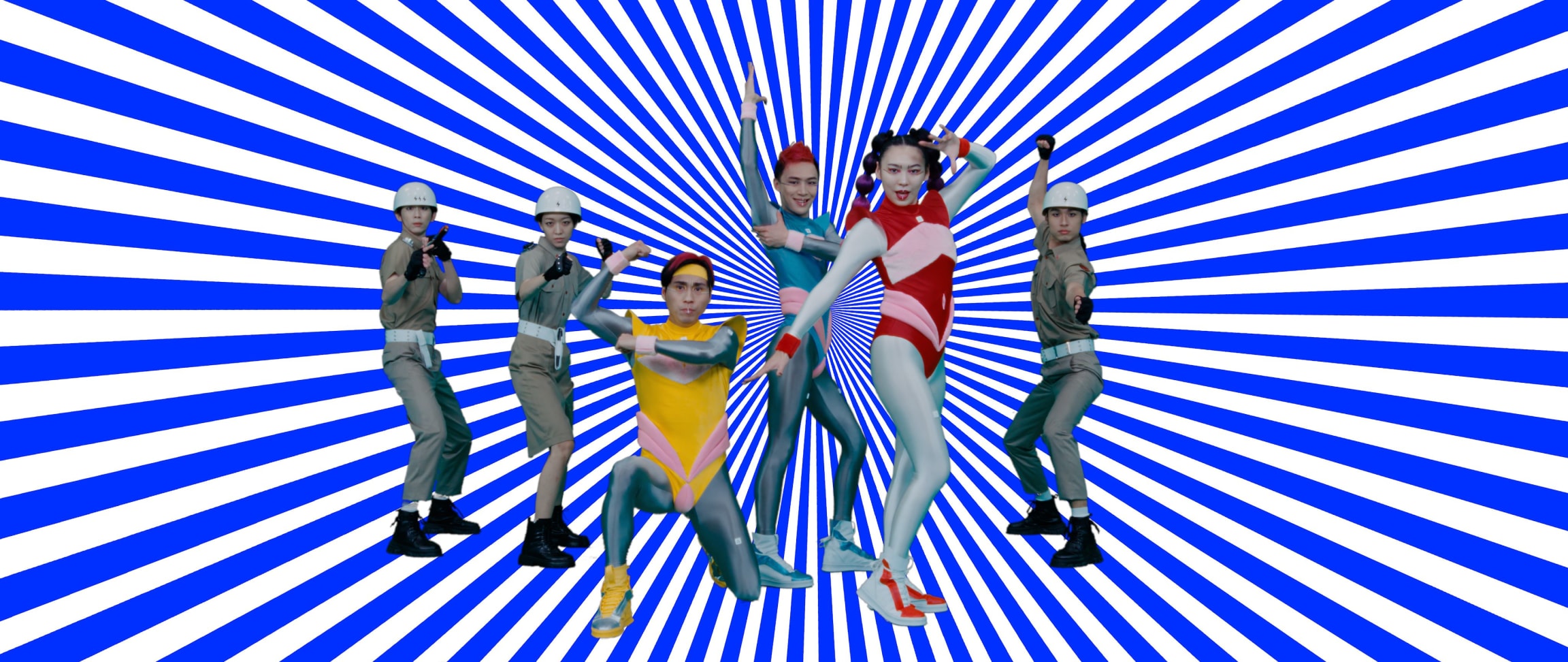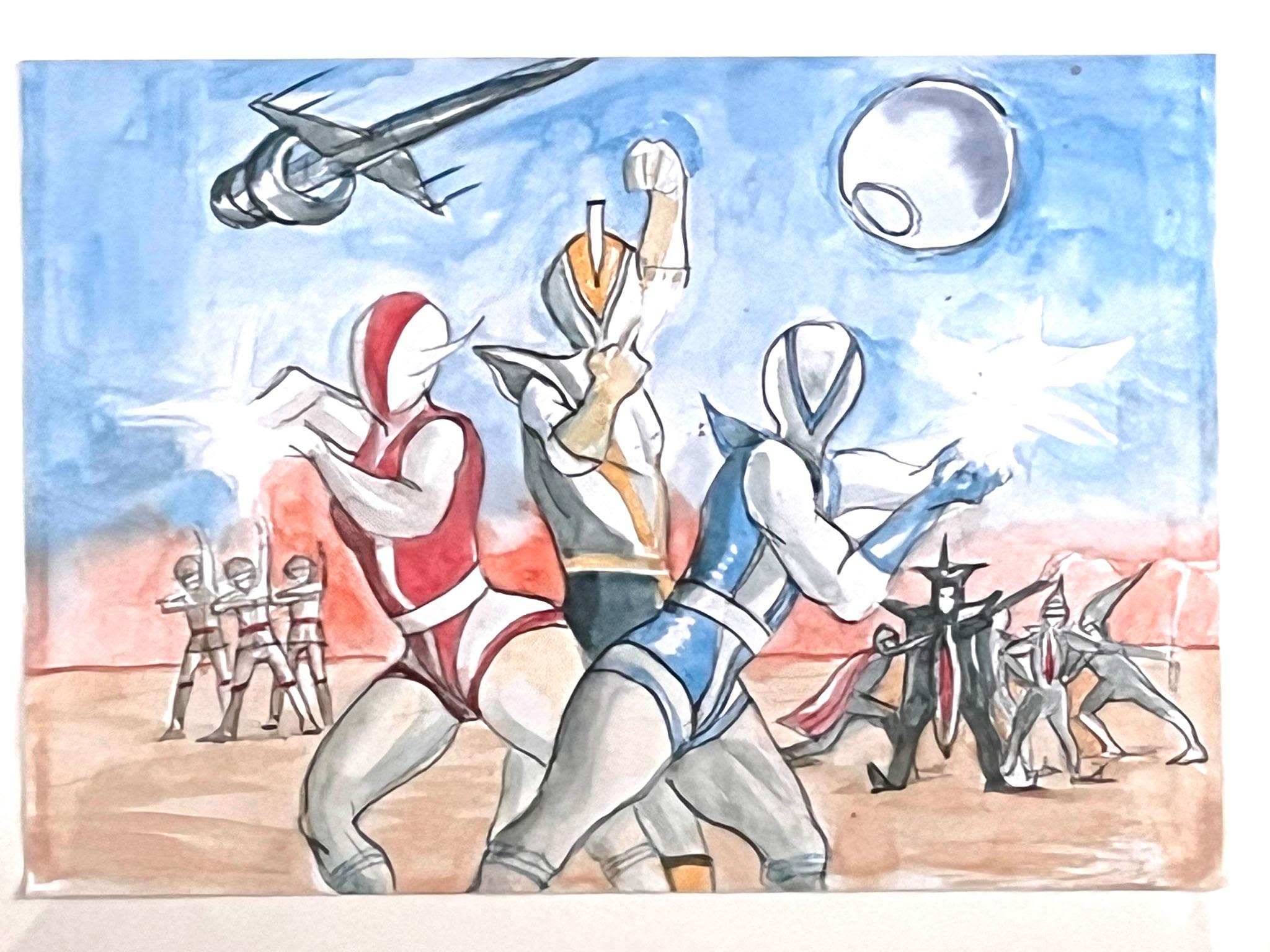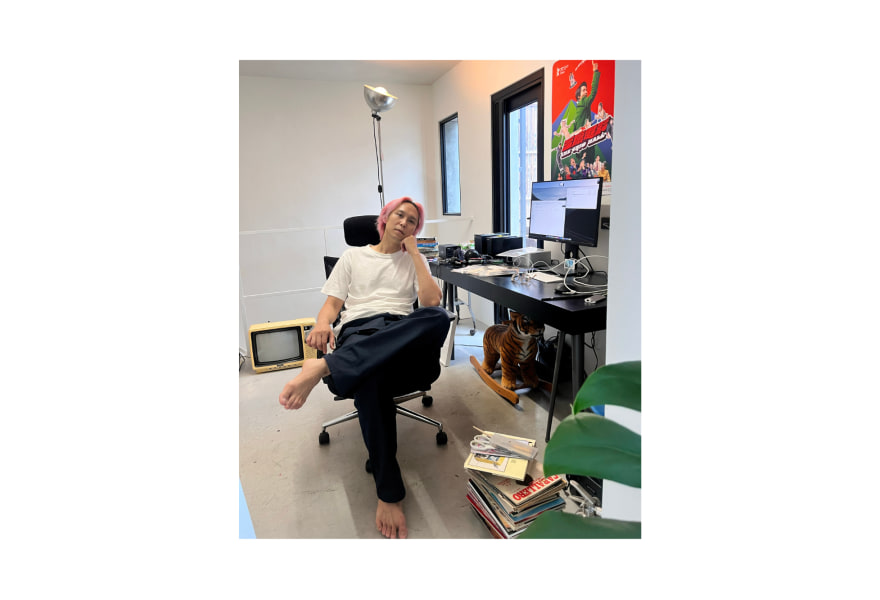17 may 2025, Martine Bontjes
The studio of…. Su Hui-Yu
If you would step into the studio of Su Hui-Yu in Taipei, you would probably find him browsing through tabloids, porn magazines, and books from the 1980s. These stories show him the narratives he grew up with as a teenager in Taiwan. This fascination flows through his art practice, where digital technology and analog drawing seamlessly converge. Hui-Yu builds layered cinematic worlds in which every detail is considered. Using his “re-shooting” technique, he connects science fiction with political issues such as nationalism, capitalism, and queerness.
For his first solo exhibition at Ellen de Bruijne Projects, Hui-Yu revisits to “The Space Warriors,” a Taiwanese science fiction series from the 1980s. He looked beyond the nostalgia of its historical imagery: “It was one of my favorite TV shows, but it looks so bad now. What happened? I decided to dig deeper.” Hui-Yu created new films that expose the ideological and cultural beliefs embedded in the time. The exhibition opens Thursday, 22 May at Ellen de Bruijne Projects in Amsterdam.
Where is your studio and how would you describe this place?
I live and work in Taipei, Taiwan. My studio is just upstairs from my apartment, very convenient. As a new media artist, I only need a small room for video editing, computing, storyboard drawing or related works. But we also have spaces for costume design, make-up and storage of costumes, which play a very important role in my productions.

The studio of Su Hui-Yu
If I were to shadow you in the studio for a day, what kinds of activities, meet-ups or routines would I witness?
Probably you'll see I'm smoking on my balcony with coffees most of the time. Nothing really luxurious, drawing sometimes, to create some core images for my new production, could be one of the scenes of a video, or an installation diagram. You'll also see I'm missing in a whole bunch of old books, magazines and publications, mostly 70s -90s stuff. Of course sometimes you might see a few meetings with my partners like producer, cinematographer, and production designer, if we were in the production phase. Computer scene will be the last part, I spend less time on it than I thought.
How do you balance analogue techniques like drawing with digital (computer) work? Do you divide tasks over different days or weeks, or do you work on them at the same time?
I have no problem with balancing. I use AI tools in 'The Space Warriors', that was my first time working with AI, and I immediately fell in love with it. New tools always create diversity, but of course we have to be aware of the invisible power behind the digital world, which penetrates into our society. Digital control looks different in every context and infiltrates our lives. If we are sure a new production is about to start, then I'll be in a phase of discipline, you can call it nervous. For the rest of the year, I'm very flexible. In the next 12 months, I will have three upcoming solos, and three whole brand new projects in progress.

Su Hui-Yu, The Space Warriors and the Digigrave, Ellen de Bruijne Projects
Could you elaborate on your “re-shooting” technique? How do you decide what to keep and where to intervene creatively?
I cited the term from film industry, in Hollywood they say "pick-up". In the industry, which means no good, someone has to rebuild the scene and re-perform the section to fix the storyline. I like the metaphor the word gave me. Movie is narrative, like history, so here is the metaphor I mean. We are making narratives, so "re-shooting" to me is a historical method, I went back to my memory and it's also the collective consciousness of the country or the time. I really can't say there is a principle of how to decide what to keep or intervene. I think most of the time I wait, the path and the clues will appear. For example, “The Space Warriors” series, I was so inspired by the costume design of these 1970s and 1980s Sci-fi TV shows. They trigger my first explosion of how to expand the new scenario.
At what point did you start to see past the nostalgia and innocence of "The Space Warriors" and begin reading it as something ideologically or culturally charged?
I am always fascinated by old things, could be film footage, VHS tapes, 1970s porn magazines, a 1990s experimental theater group, or a cult film. Mostly they are from around the 1980s, right in the last decade of martial law governance in Taiwan. That was the time when I was a kid. I had the idea about remaking “The Space Warriors” one night when I was drunk and dancing with my partner, we were listening to electronic music and randomly watching YouTube videos. It was a flash in my head, I chose the old footage of the TV series and found that it's the one! Then I couldn't stop thinking of the Sci-fi series, it was one of my favourite TV shows but it looks so bad now. What happened? I decided to dig deeper.

Su Hui-Yu, The Space Warriors and the Digigrave, Ellen de Bruijne Projects
In your video, the aliens from the “Makelove” species challenge capitalist and heteronormative norms. In what way is your video a metaphor for Taiwan’s political or cultural tensions?
These kinds of Sci-fi stories in East Asia were mostly the same, they promoted collectivism, patriarchy, and they hint the importance of the government or unit of society. It was also functional under the ideology of the Cold War era, Taiwan, Japan and Korea were all following the narrative. And it's coming back again nowadays. Aliens presented threats, the enemy of "our group", or the others. But I don't want to make a clear point of view, I want to offer chaotic scenes. Who is the threat? Threat of what? What kind of principle should we believe? No specific way to find the answers.

Su Hui-Yu, The Space Warriors and the Digigrave, drawing/storyboard No.1, 2025, Ellen de Bruijne Projects
In your previous work you were inspired by historical baroque paintings. Are there specific (art) historical periods or figures that influenced your latest films?
European art history after the 15th century is a worldwide heritage to me. I cited Baroque or Catholic painting very often because to me it's sometimes very dark and violent, which fits my taste and topic very much. This time I cited Michelangelo's “Volta della Cappella Sistina” in the film, it's hilarious. They are universal languages.
How do you think the reception of ‘Space Warriors and the Digigrave’ differs between European and Taiwanese audiences?
In Asia usually there are censorship issues, institutes might worry about being reported by the audience or causing bad response from the public. In Taiwan people quite like it actually, the metaphors make sense to them. In Europe I think the first impression was mostly "it's a story of someone else", but ideally I hope that they will gradually realise that it's a story about everyone. After all the background, the 'power ranger' series, is also a collective memory.

Su Hui-Yu, The Space Warriors and the Digigrave, drawing/storyboard No.5, 2023, Ellen de Bruijne Projects
Apart from the videos you also present drawings. Are there elements or ideas that only emerge in the drawings, that don’t work in your videos?
Yes, the drawings are closer to my intuition, it's different flavours. But it doesn't mean that the video or the digital images are away from my heart. They were simply different perspectives, offering more imaginations.
On 27 May your film ‘The Trio Hal’ will be presented at Eye Filmmuseum in Amsterdam. What can we expect?
'The Trio Hall' is a unique project compared with my previous projects. It was a museum exhibition first, then a film was made during and "in" the exhibition. It's an open structure, it has a variety show look, with very political topics, and hilarious but also serious or abstract performances. It talks about geo-politic tensions, war, history, modern art and human nature, it tries to challenge our political stances, eventually it leads the audience to a chaotic ending scene. You will either love it or hate it. Caution!
Are there any dream projects or collaborations you haven’t realized yet, or things you would pursue if anything was possible?
I'm recently working on a new idea - making an exhibition in a gallery, and a film murder scene starts with the gallery opening. The film is about revenge, in the exhibition duration, chain murders keep happening, which are created and installed like art pieces. In the storyline, a detective investigates the crime. To understand the clues of these artwork-like killings, he gradually becomes an art critic, while the 'artist' is like a criminal. In this project, two parallel universes exist at the same time, a real exhibition and the making of a crime film. The revenge is toward the chauvinist and nationalist ideology in the society of East Asia, which is also an extension of my previous video 'The Women's Revenge'. It will be a big scale project, I'm working very hard on it.
